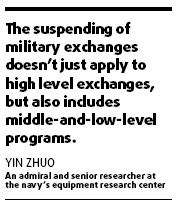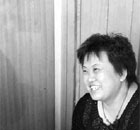Asia-Pacific
US warned to be cautious of future actions
By Li Xiaokun and Ai Yang (China Daily)
Updated: 2010-02-26 07:50
 |
Large Medium Small |
Beijing says US should avoid words and actions that might harm ties
The Defense Ministry Thursday said there is no change in China's plan to suspend military visits with the US in retaliation for Washington's arms sales to Taiwan, confirming reports that several high-level visits between the two have been postponed.

Chinese experts said this is perhaps just the start of the downgrading of military exchanges with the US by China, and that such punitive actions are likely to be in force over a longer period compared to the last time Washington proposed an arms deal with Taiwan.
"China has decided to suspend scheduled visits between the two militaries. That stance has not changed," Senior Colonel Huang Xueping, the ministry's spokesman, said in a press release.
Unnamed Pentagon officials told Reuters on Tuesday that China has postponed the planned visit to the US by its chief of the General Staff of the People's Liberation Army (PLA) Chen Bingde and the visit by commander of the US Pacific Command has also been delayed.
Rear-Admiral Yang Yi at the University of National Defense said although the frozen exchanges will also affect China, Beijing would nonetheless play them out with a tough hand.
"The punishments will be carried out step by step, the US may not have seen a lot of action now but that doesn't mean they are not going to in the future," he said. "Even if China's own interests will be compromised temporarily, we have to weigh what's more important in the long run."
"The move has stopped them (US officers) from obtaining important military information from China, which has always been something America wants and is crucial in terms of their strategic decisions," Yin said. Actually sometimes communication with Chinese officers of lower levels is even more important, he added.
Yin said the recovery of China-US relations would take longer than the last time, when US Secretary of State Hillary Clinton's visit in early 2009 thawed the frozen military ties hurt by the proposed US arms sales to Taiwan in the autumn of 2008.
"Now the weapons to be sold are more powerful and advanced. Besides the package also enables Taiwan to enjoy some technologies of the North Atlantic Treaty Organization and Japan." Therefore America's attitude and effort are crucial to repairing the relationship, he said. "Last time it was China and the US both making efforts, but this time it depends solely on America."
Huang Thursday also urged the Pentagon to be "cautious" in commenting on Taiwan's fighter jets capacity. A document, released by the US Defense Intelligence Agency recently, said that many of Taiwan's roughly 400 combat aircraft would not work in action due to age and maintenance problems, and upgrades are needed as the mainland's military gets stronger.
Experts have said the US Congress is highly likely to use the report to pressure the Pentagon to sell F-16 fighter jets to Taiwan.
Huang said China "requests the US to be cautious in its wording and actions", and "avoid causing further harm" to cross-Strait relations.










